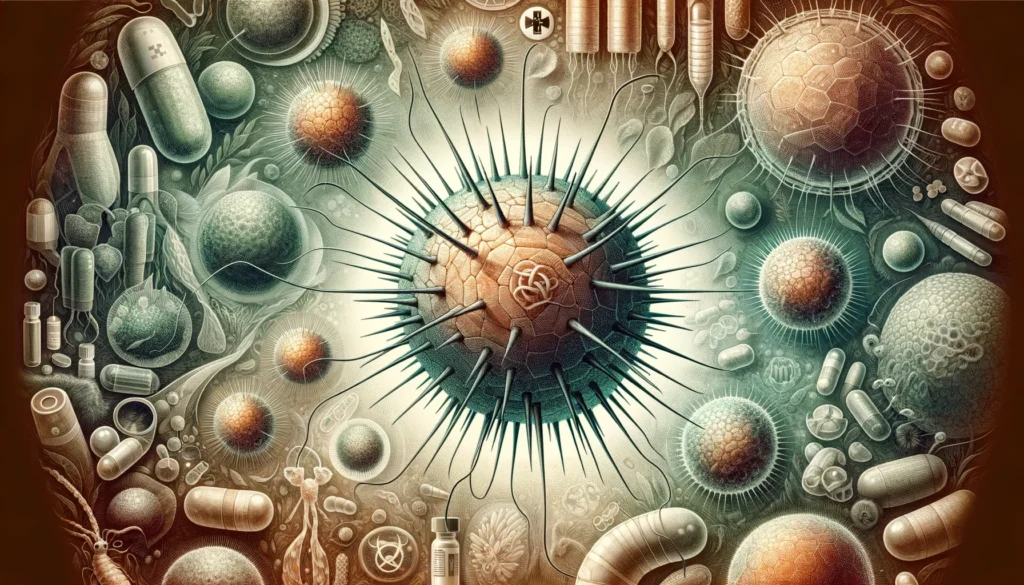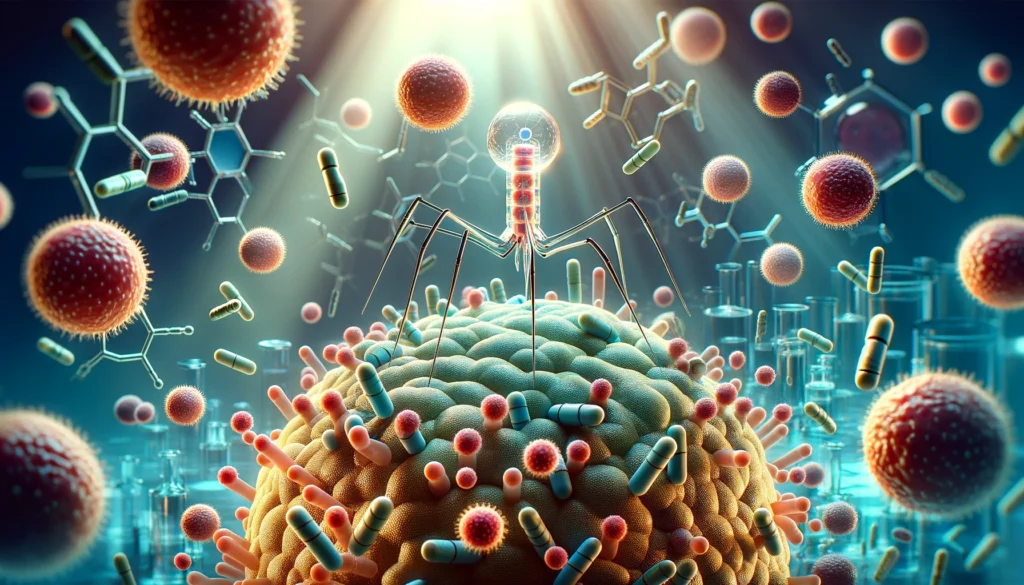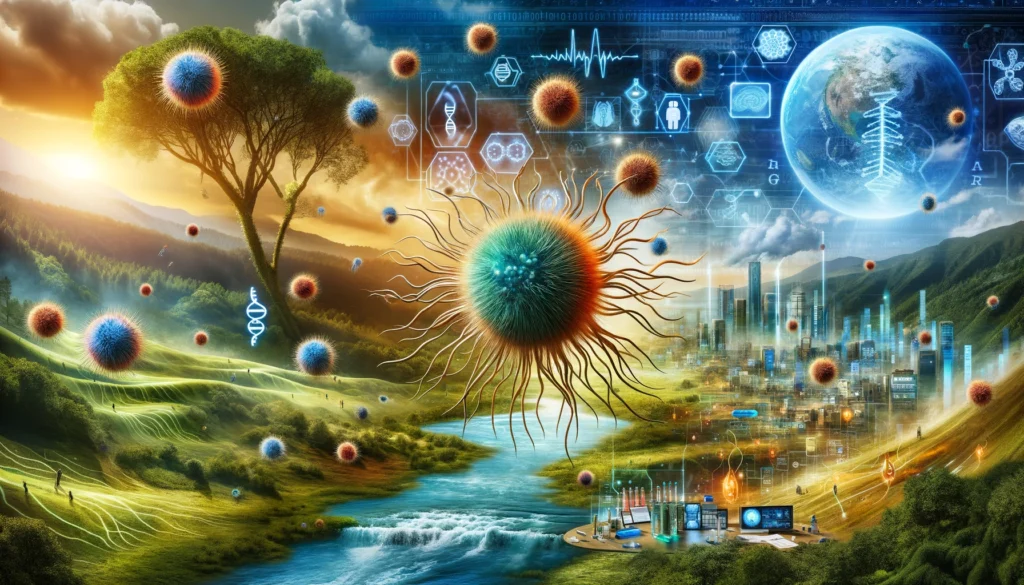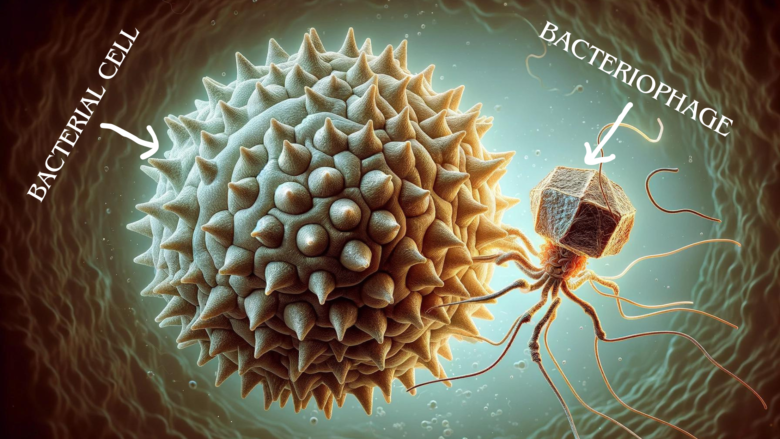The term “bacteriophage” literally means “bacteria eater,” reflecting their ability to destroy bacterial cells. Bacteriophages, often simply called phages, are among the most abundant and diverse entities in the biosphere. Invisible to the naked eye, these microscopic viruses specifically target and infect bacteria. Discovered in the early 20th century, phages have since unveiled a complex world where viruses play a critical role in regulating bacterial populations and influencing the dynamics of microbial ecosystems.
Phages exhibit astonishing diversity in shape and genetic makeup, adapting to infect bacteria across various environments, from ocean depths to human intestines. Their life cycle, particularly the lytic cycle, where phages replicate within and burst out of their bacterial hosts, highlights a natural mechanism of bacterial control. This process not only maintains ecological balance but also offers insights into evolutionary pressures that drive microbial adaptation and diversity.

The intrigue surrounding bacteriophages extends beyond their ecological role. Scientists are exploring their potential in applications ranging from medicine to biotechnology, harnessing their specificity and efficacy to offer innovative solutions to some of the most persistent challenges in these fields. As we delve deeper into the world of bacteriophages, we uncover a fascinating narrative of biological interaction, survival, and co-evolution, revealing a hidden universe teeming with activity and potential.
Bacteriophages in Nature
Bacteriophages play a pivotal role in the environmental ecosystem, acting as regulators of bacterial populations and contributing to the nutrient cycle. Their presence is ubiquitous, found in every habitat where bacteria exist, from the soil to the oceans to the human gut.
- Regulators of Bacterial Populations
Phages control the growth and distribution of bacterial populations, ensuring no single species dominates the microbial community. This regulatory function is crucial in maintaining ecological balance and biodiversity. For example, in aquatic ecosystems, phages limit the growth of harmful algal blooms by infecting and lysing the bacteria that support these blooms. This not only prevents the overgrowth of algae but also facilitates the recycling of nutrients, essential for the health of aquatic environments.

- Influencers of Evolution and Diversity
Phages are also instrumental in driving the evolution and diversity of bacterial species. Through a process known as transduction, phages can transfer genetic material between bacteria, introducing new genes and capabilities. This horizontal gene transfer is a significant factor in the rapid adaptation and evolution of bacterial species, enabling them to develop resistance to antibiotics or to exploit new ecological niches.
- Eco-system Engineers
The impact of phages extends beyond mere population control and genetic exchange. They influence the very structure and function of microbial communities. By selectively preying on certain bacterial species, phages can alter the composition and functional dynamics of these communities, affecting nutrient cycling, organic matter decomposition, and overall ecosystem productivity.
In summary, bacteriophages are integral to the natural world, shaping the dynamics of microbial communities and ecosystems. Their role as regulators, evolvers, and engineers in nature underscores their importance in sustaining ecological balance and promoting biodiversity.
Bacteriophages in Medicine
Bacteriophages hold a promising key to innovative treatments in the medical field, particularly as powerful allies against antibiotic-resistant bacteria, one of the most daunting challenges in modern medicine.
- Combatting Antibiotic Resistance
The rise of antibiotic-resistant bacteria has rendered some of our most potent drugs ineffective, leading to a global health crisis. Bacteriophages offer a natural, effective alternative. Their ability to specifically target and kill bacteria makes them ideal candidates for treating bacterial infections that no longer respond to traditional antibiotics. Phage therapy, the therapeutic use of bacteriophages to treat bacterial infections, is gaining traction as a viable treatment option, particularly for cases deemed untreatable with conventional methods.

- Personalized Medicine and Phage Therapy
Phage therapy is uniquely adaptable to personalized medicine. Since bacteriophages are specific to particular bacterial strains, they can be tailored to individual infections, offering a precision approach to treatment. This specificity reduces the risk of damaging beneficial bacteria in the body, a common drawback of broad-spectrum antibiotics.
- Research and Clinical Trials
Significant research and clinical trials are underway to understand the full potential and limitations of phage therapy. Studies focus on identifying the most effective phages, understanding their interaction with human immune systems, and developing delivery mechanisms that ensure the phages reach their bacterial targets in the body.
- Future Prospects in Medicine
Looking forward, the integration of bacteriophages into medical practice could revolutionize the treatment of bacterial infections. Alongside their use in therapy, phages are also being explored as tools for diagnostics, bio-control agents in food safety, and vectors in gene therapy, indicating their versatile potential in medical science.
In conclusion, the medical applications of bacteriophages represent a frontier in the fight against bacterial infections, particularly those resistant to antibiotics. Their targeted approach not only promises to enhance treatment efficacy but also to usher in a new era of precision medicine in bacterial infection management.
Bacteriophages in Biotechnology and Research
Bacteriophages have emerged as vital tools in biotechnology and scientific research, offering novel solutions and advancing our understanding of biological processes.
- Genetic Engineering and Molecular Biology
In the realm of genetic engineering, phages are used to introduce new genetic material into bacteria, a technique that has been pivotal in developing recombinant DNA technology. This capability has not only advanced genetic research but also facilitated the production of pharmaceuticals, enzymes, and vaccines. Phages contribute to molecular biology as vectors in cloning processes, enabling the study and manipulation of genes, and enhancing our understanding of gene function and regulation.

- Phage Display Technology
Phage display technology is another innovative application where phages display peptides or proteins on their surface, allowing for the screening and identification of molecules with high affinity for specific targets. This method has significant implications in drug development, enabling the discovery of new therapeutics, including antibodies and vaccines.
- Environmental Applications
In environmental biotechnology, bacteriophages are employed as biocontrol agents to manage pathogenic bacteria in water, food, and agricultural products. Their specificity ensures that only the harmful bacteria are targeted, minimizing the impact on the surrounding environment and non-target organisms.
- Advancements in Phage Research
The field of phage research continues to grow, with studies exploring the interactions between bacteriophages and their bacterial hosts, the evolution of phage-bacterial dynamics, and the development of phage-resistant bacterial strains. These investigations not only provide insights into microbial ecology but also inform the practical applications of phages in various sectors.
In summary, the role of bacteriophages in biotechnology and research is multifaceted and expanding. Their unique properties and interactions with bacteria offer a wealth of opportunities for scientific advancement and practical applications, making them invaluable tools in the ongoing quest to understand and harness biological processes.
Conclusion: The Future of Bacteriophage Research
The exploration of bacteriophages has entered a renaissance period, with their potential to impact science, medicine, and environmental management increasingly recognized. The future of bacteriophage research promises a wealth of innovative applications and a deeper understanding of microbial interactions.

- Transforming Medical Treatments
In medicine, the continued development of phage therapy could drastically change how we treat bacterial infections, especially those resistant to antibiotics. By perfecting the use of phages as natural, targeted antibacterial agents, we can offer more effective and personalized treatment options, reducing the global threat of antibiotic resistance.
- Driving Scientific Innovation
In the realm of science, phages are tools for unraveling the complexities of microbial ecology and evolution. Research in this area not only broadens our biological knowledge but also fuels innovations in genetic engineering, synthetic biology, and bioinformatics, leading to breakthroughs in drug development, agriculture, and beyond.
- Environmental Stewardship
From an environmental perspective, phages offer sustainable alternatives for controlling pathogenic bacteria in water, food sources, and agriculture, aligning with the principles of ecological balance and conservation. Their application in biocontrol and bioremediation strategies holds the promise of reducing chemical dependencies and mitigating environmental impacts.
- A Future of Collaboration and Discovery
The interdisciplinary nature of bacteriophage research encourages collaboration among biologists, ecologists, medical researchers, and technologists. This collaborative approach is key to unlocking the full potential of phages, fostering innovations that could address some of the most pressing challenges facing our world.
In conclusion, the study and application of bacteriophages stand at the frontier of biological research, offering a glimpse into a future where these microscopic entities play a central role in advancing health, science, and environmental sustainability. As we continue to explore the vast potential of bacteriophages, we may find that these invisible defenders of the microbial world hold the keys to some of the most innovative and transformative solutions for our planet.

Author’s Note
Thank you for joining me on this journey through the microscopic world of bacteriophages. It’s my hope that this exploration has not only informed but also inspired you to appreciate the unseen yet profound influence these entities have on our lives and the world at large. Biology is a testament to the complexity and wonder of life, with phages playing a pivotal role in the tapestry of existence. May we continue to uncover the secrets of these microscopic marvels and harness their potential for the betterment of humanity and the planet.
G.C., Ecosociosphere contributor.
References and Further Reading
- “Bacteriophages: Biology and Applications” by Elizabeth Kutter and Alexander Sulakvelidze
- A comprehensive guide to the biology of bacteriophages and their applications in various fields.
- “The Bacteriophages” edited by Richard Calendar
- An extensive resource covering the biology, genetics, and biochemistry of bacteriophages, offering a detailed look into phage research.
- “The Perfect Predator: A Scientist’s Race to Save Her Husband from a Deadly Superbug: A Memoir” by Steffanie Strathdee and Thomas Patterson
- A gripping account of how bacteriophage therapy was used to combat a deadly antibiotic-resistant infection.





Comments
Your article helped me a lot, is there any more related content? Thanks!
Your article helped me a lot, is there any more related content? Thanks!
Your point of view caught my eye and was very interesting. Thanks. I have a question for you.